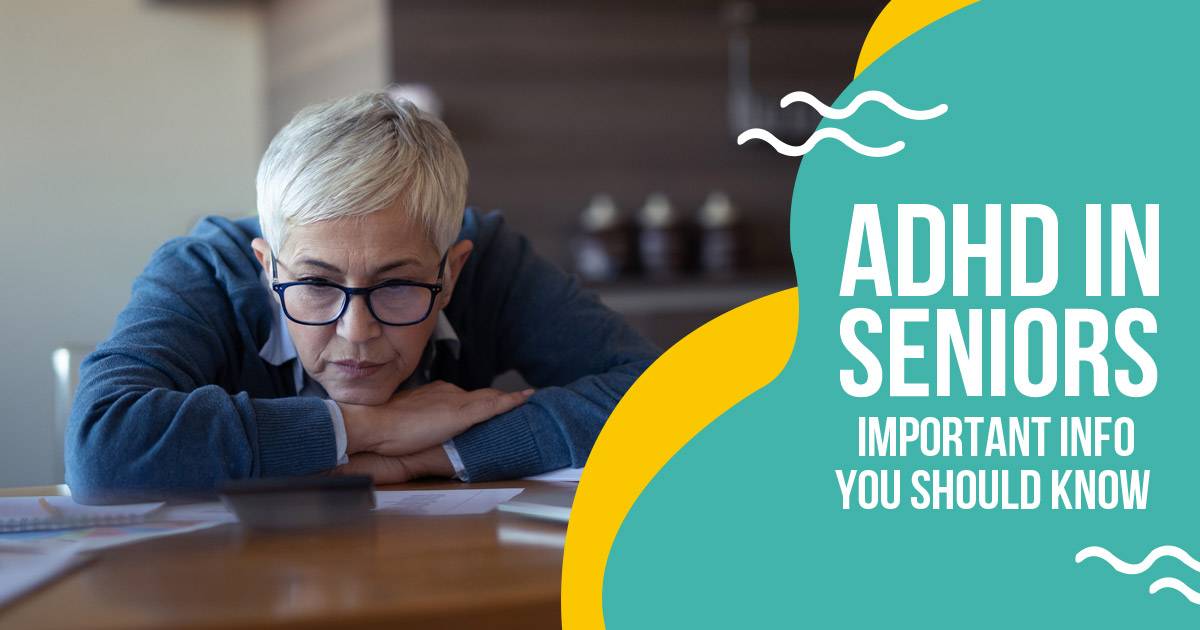ADHD in Seniors: Important Info You Should Know

Attention Deficit Hyperactivity Disorder (ADHD) is often thought of as a childhood condition, but many seniors with ADHD are affected by the same challenges they faced in younger years. While it can be overlooked or misdiagnosed in older adults, understanding ADHD in seniors is crucial for managing symptoms that can impact daily life. With the right support, treatment, and awareness, seniors can improve their quality of life even with ADHD.
Do ADHD Symptoms Get Worse As You Age?
As we age, it’s common to experience a decline in cognitive abilities like memory and focus. For seniors with ADHD, these natural changes can make symptoms more pronounced. Forgetfulness, lack of concentration, and difficulty organizing tasks might intensify, leading many to wonder if ADHD worsens with age. While ADHD doesn’t necessarily progress, the overlap of aging and ADHD symptoms can create the perception of worsening.
In addition to cognitive decline, ADHD symptoms in seniors may become more noticeable due to lifestyle changes. Retirement, changes in routine, or increased downtime can reduce the structure many people rely on to manage their ADHD symptoms. For some, this shift may exacerbate the difficulties associated with ADHD, making treatment and support even more important.
Symptoms of ADHD in Seniors
Recognizing the signs of ADHD in seniors can be tricky, as these symptoms often resemble normal aspects of aging. However, certain behaviors may signal ADHD rather than simply the aging process. Below are key indicators:
- Forgetfulness: Seniors with ADHD may frequently forget appointments, lose track of important tasks, or misplace everyday items, often to a greater extent than their peers.
- Disorganization: Difficulty maintaining order in personal spaces or managing time effectively can be prominent in older adults with ADHD, leading to frustration and stress.
- Restlessness: While hyperactivity may decrease with age, many seniors still feel an inner restlessness or fidget during moments of inactivity.
- Impulsivity: Quick decisions without considering the consequences, such as financial choices or social interactions, may still be common for older adults with ADHD.
- Difficulty concentrating: Seniors with ADHD may find it challenging to stay focused during conversations or while completing tasks, often becoming easily distracted.
Treatment Options for ADHD in Seniors
Although ADHD symptoms in seniors can pose unique challenges, there are effective treatment strategies that can help manage these difficulties. Tailoring treatment to meet the needs of older adults ensures they can maintain independence and improve their well-being. Below are some common approaches:
Psychological Counseling
One of the most effective treatments for ADHD in seniors is psychological counseling, often referred to as cognitive-behavioral therapy (CBT). Counseling helps seniors develop coping strategies for managing symptoms like disorganization and impulsivity. By working with a therapist, older adults can gain tools to handle ADHD in daily life, reducing stress and improving focus.
Medications and Stimulants
Medications, including stimulants like methylphenidate (Ritalin) and non-stimulant options, are frequently used to manage ADHD. In older adults, dosages are often adjusted to avoid potential side effects, such as increased heart rate or blood pressure. While medication can be beneficial, careful monitoring is crucial, particularly in seniors, due to potential interactions with other prescriptions.
Education
Understanding ADHD is vital for both seniors and their families. By learning about the condition, seniors can better recognize their symptoms and identify triggers. This education empowers them to actively participate in their treatment plan, make informed decisions, and advocate for the care they need. Family members can also provide better support when they’re informed about ADHD’s impact.
Skills Training
Skills training helps seniors learn techniques for managing daily tasks more efficiently. Whether it’s organizing their home, managing time, or improving focus, practical strategies can be life-changing. These tools are particularly useful in helping seniors cope with the overlapping challenges of ADHD and aging, allowing them to navigate their day-to-day with greater ease.
ADHD in Older Women
While ADHD affects both men and women, ADHD in elderly women can often go undiagnosed or misdiagnosed. This is largely because the symptoms in women tend to present differently than in men. Women are more likely to internalize their symptoms, leading to anxiety or depression, which might be mistaken for the primary issue. Many women reach older adulthood having never been diagnosed, which can result in ongoing struggles with focus, organization, and stress.
In elderly women, symptoms like restlessness and difficulty concentrating may worsen as hormonal changes from menopause interact with ADHD. The combination of aging, hormonal shifts, and ADHD can create significant challenges for older women, impacting their ability to manage household tasks, social interactions, and even health care. However, with proper treatment and support, women with ADHD can improve their quality of life and reduce these struggles.
Managing ADHD in Seniors for a Better Life
ADHD doesn’t disappear with age, and it’s important to recognize how seniors with ADHD can be affected. Although ADHD symptoms in seniors might become more apparent as cognitive abilities change over time, treatments such as counseling, medication, and skills training can make a significant difference. Seniors, particularly elderly women, can benefit from a personalized treatment approach, leading to a more organized and less stressful lifestyle.
Sp, while aging can bring unique challenges for those with ADHD, it doesn’t have to worsen one’s quality of life. With the right support, seniors with ADHD can maintain independence and enjoy their later years fully.
